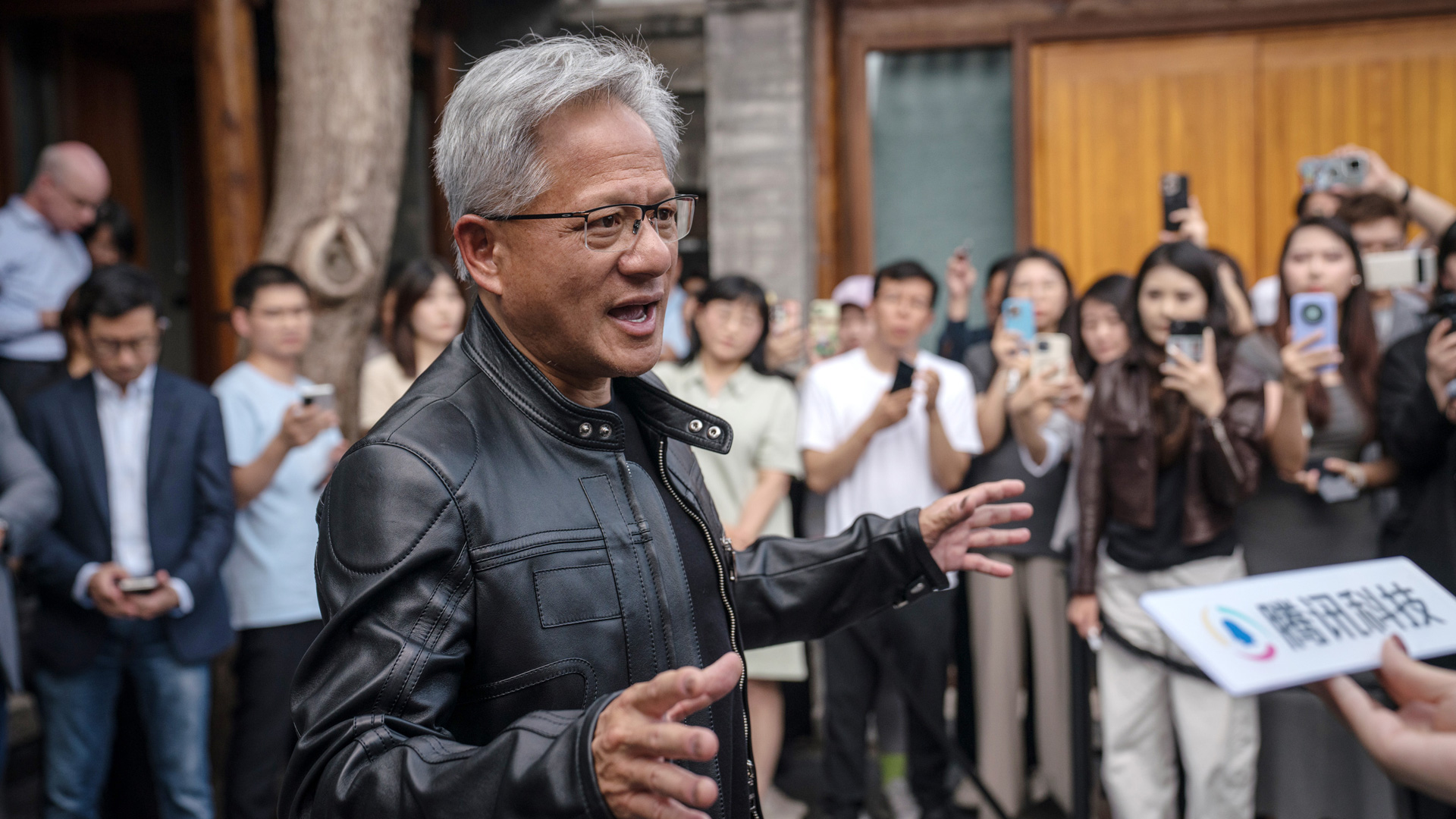Trump eases China export restrictions to aid trade talks — White House seeking face-to-face with Xi Jinping as dissenters warn H20 reversal is a dangerous mis-step
As trade talks resume this week, security experts pressure the White House to maintain economic pressure points.

The U.S. government has reportedly relaxed the curbs on technology-based exports to China in order "to avoid hurting trade talks with Beijing" and help secure a face-to-face meeting between President Trump and Xi Jinping, according to the Financial Times. This follows what is described as "months" of encouragement by the administration to the industry and security bureau of the Commerce Department to avoid any tough moves on China. Although the industry has responded swiftly and positively, not all members of the Trump administration are happy with this ongoing stance.
U.S. President Trump has postured with aggressive stances on trade towards China for years, and made a major show earlier this year of halting shipments of important technology products, like GPUs for AI training and inference, alongside instigating sharp import tariffs that all but halted much of China's trade with America. However, although his administration talked a big game in its trade war with China, a new report suggests that its stance has been far more moderated behind the scenes and that it's now all-but-halted its export restrictions as part of the ongoing trade talks.
The pause in blocks on exports is reportedly an effort to augment the ongoing Trump administration trade talks with China, with Trump himself keen to secure a meeting with Chinese President Xi Jinping sometime this year. Talks are set to resume in Stockholm, Sweden, this Monday, though it's not clear what progress is expected to be made. Treasury Secretary Scott Bessent and Chinese Vice Premier He Lifeng will meet, with some suggestions that a further meeting between the two countries' leaders will be a major topic of discussion.
Trump himself said on Friday, before leaving for his trip to Scotland, that the "confines" of a deal with China had been made, but wouldn't elaborate on any details.
The more subdued stance towards China and exports to the country have pleased many industry heads. Nvidia announced earlier this month that it would resume trade of its in-demand H20 AI inference GPU to China. Though this comes in the wake of reports of major smuggling and illicit repair operations, which maintained Chinese industry access to this kind of technology, despite the trade blocks.
However, while companies that thrive on Chinese trade are keen to take advantage of this lull in economic hostilities, not everyone within the Trump administration is pleased. The Financial Times reports that a letter signed by over 20 ex-US administrative officials has been sent to the Trump administration, urging it to reverse course on its tech export bans, especially with regard to Nvidia GPUs.
"The decision to ban H20 exports earlier this year was the right one. We ask you to stand by that principle and continue blocking the sale of advanced AI chips to China as America works to maintain its technological edge," it reads.
Get Tom's Hardware's best news and in-depth reviews, straight to your inbox.
It goes on to suggest that the relaxation of restrictions would embolden China to chase further exceptions and special treatment, support its military development, accelerate its AI ambitions, and harm America's own supply of the much-needed H20 GPU, describing the move as a "mis-step that endangers the United States' economic and military edge in artificial intelligence."
The White House has yet to release a statement on the letter or the alleged cessation of trade blocks.
Follow Tom's Hardware on Google News to get our up-to-date news, analysis, and reviews in your feeds. Make sure to click the Follow button.

Jon Martindale is a contributing writer for Tom's Hardware. For the past 20 years, he's been writing about PC components, emerging technologies, and the latest software advances. His deep and broad journalistic experience gives him unique insights into the most exciting technology trends of today and tomorrow.
-
SparklyIO I don't get it. what is there to "deal"?? President Trump created the tariffs that Americans pay with a pen stroke. They could end it as easily?Reply
And as far as banning us chips to China: that is a security decision, not an economic one (though it hits Nvidia's revenue, poor guys...). It would be nice to one day get an MSRP GPU. -
joeer77 Poorly written. Learn to write better. Make your message clear.Reply
"Trump freeze on export restrictions to China reportedly in aid of trade talks." What does this even mean? Can't understand your gibberish.
Here's another one: "The U.S. government has reportedly halted the curbs on technology-based exports to China" Halted the curbs? You mean the US government has lifted the export freeze to China? Where did you learn to write? -
bit_user If the point of the tariffs is to increase leverage in negotiations to even out the trade imbalance, I don't really see much that China wants to buy. I think there's little beyond certain agricultural products, AI chips, and tools + software to help grow their own chip industry that they want to buy from the USA. And we don't really want to sell them much of the latter category. Agricultural exports don't seem like they'll make much of a dent in the trade deficit. So, it seems to me that a substantial tariff is already baked in the cake.Reply
Probably the biggest variable is getting China not to restrict exports like rare earth minerals. -
bit_user Reply
It seemed clear enough to me. What it means is that the USA previously restricted exports of certain things to China. President Trump temporarily lifted those restrictions (i.e. the "freeze" part), as a goodwill measure, because it supposedly helped the trade negotiations move along.joeer77 said:Poorly written. Learn to write better. Make your message clear.
"Trump freeze on export restrictions to China reportedly in aid of trade talks." What does this even mean? Can't understand your gibberish.
Yeah, pausing restrictions seems almost like a double-negative, but it's not really. It's a complex idea to convey in shortened headline form.
IMO, halting is different than lifting. I think halting is more tenuous or temporary, whereas lifting doesn't have the same connotation that they're likely to return.joeer77 said:Here's another one: "The U.S. government has reportedly halted the curbs on technology-based exports to China" Halted the curbs? You mean the US government has lifted the export freeze to China? Where did you learn to write? -
John Nemesh Reply
Like everything involving TACO, it's clear as mud. I believe nothing that doesn't have a signed treaty attached.bit_user said:It seemed clear enough to me. What it means is that the USA previously restricted exports of certain things to China. President Trump temporarily lifted those restrictions (i.e. the "freeze" part), as a goodwill measure, because it supposedly helped the trade negotiations move along.
Yeah, pausing restrictions seems almost like a double-negative, but it's not really. It's a complex idea to convey in shortened headline form.
IMO, halting is different than lifting. I think halting is more tenuous or temporary, whereas lifting doesn't have the same connotation that they're likely to return. -
bit_user Reply
I was just talking about the headline, which is what the other poster was complaining about.John Nemesh said:it's clear as mud. I believe nothing that doesn't have a signed treaty attached. -
nookoool I kinda don't think the Chinese government see having legal access to the h20 is a big deal since their companies can already get various chips off the black market which makes it price/performance comparable to the huawei ascend. Now if it was the latest more advance chips or euv....Reply -
bit_user Reply
I disagree. Having to buy stuff off the black market means paying a lot more for it, and probably the volume is still substantially reduced vs. what you'd get if the doors were wide open.nookoool said:I kinda don't think the Chinese government see having legal access to the h20 is a big deal since their companies can already get various chips off the black market
People continually seem to think that sanctions need to be water-tight, or they're no good. This is flawed logic, and we know it doesn't apply here because China wouldn't have been making a fuss over it if they were getting everything they needed.
Another big down downside of relying on the black market is that it probably ends up funding criminal smuggling groups who also smuggle other contraband and get involved in other criminal activities. You can think of crime groups like a business. They grow when they get revenue, and when one revenue stream dries up, they turn towards others. -
nookoool Replybit_user said:I disagree. Having to buy stuff off the black market means paying a lot more for it, and probably the volume is still substantially reduced vs. what you'd get if the doors were wide open.
People continually seem to think that sanctions need to be water-tight, or they're no good. This is flawed logic, and we know it doesn't apply here because China wouldn't have been making a fuss over it if they were getting everything they needed.
Another big down downside of relying on the black market is that it probably ends up funding criminal smuggling groups who also smuggle other contraband and get involved in other criminal activities. You can think of crime groups like a business. They grow when they get revenue, and when one revenue stream dries up, they turn towards others.
Having to pay more would encourage Chinese firms to buy and invest in domestic substitutes. Having black market access gpu will also help force domestic companies to be competitive. Some of the "fuss" could just be politics as the real end goal is variation of having it's own domestic chips using EUV or being able to fab the latest/greatest at tsmc.
I don't think the Chinese goverment see enterprises smuggling santion tech as criminal. My guess is some may be part of the state militia.